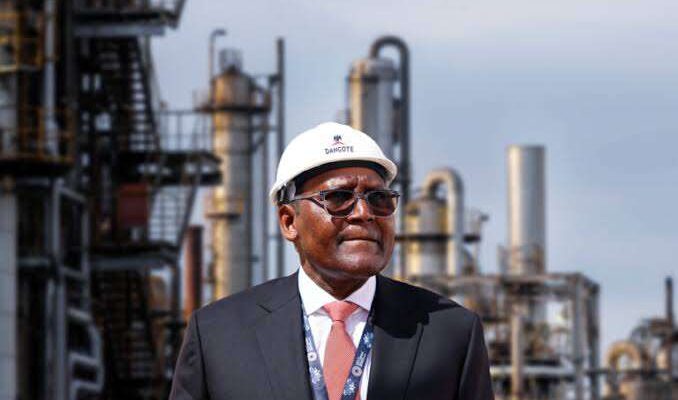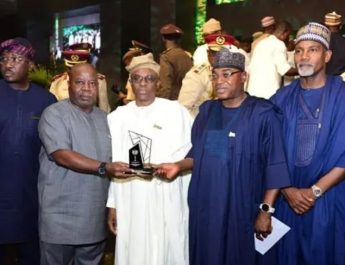The desire and consequent subtle plot by Aliko Dangote to arm twist the authorities to decree his refinery as the sole supplier of refined petroleum products in Nigeria, is being resisted by patriotic citizens across the country
By Ikenna Princewill
One of the most significant events that took place in Nigeria on the 8 day of June, 2007, revolved around the Anambra State-born billionaire business mogul, Cletus Ibeto. Ibeto is the owner of the Ibeto Cement Company. On the above date, he had put up a petition to the Ministries of Finance and Commerce and Industry, as well as to the Nigeria Customs Service (NCS), appealing to these authorities to intervene in the closure of the Ibeto Cement Company by the government of former President Olusegun Obasanjo.
In 2005, the Ibeto Cement Company had become a thorn in the business flesh of the Dangote Group’s Obajana Cement Company, West African Portland Cement Company (WAPCO) and Benue Cement Company. These cement companies belong to Aliko Dangote, President of the Dangote Group of Companies. Dangote, referred to as shrewd capitalist would go into dangerous extreme to exterminate competition in any sector he has interest in order to establish monopoly for his business interest. This is his stock-in-trade.
Sensing that the Ibeto Cement Company was crashing the price of cement for the benefit of Nigerians, Dangote had cried to then President Obasanjo to intimate him that if swift action was not taken against the Ibeto Cement Company, their business interest in the building sector would crash to an extent that the three cement companies belonging to the Dangote Group may collapse, leaving Ibeto Cement Company a monopoly.
On his part, Obasanjo in his bid to protect the business interest of his cronies, had deployed frivolous allegations against the Ibeto Cement Company for which he used presidential fiat to order its closure. Barely one month after he assumed office as the President, Umaru Musa Yar’Adua in an obvious move to detach himself from the devilish legacies of Obasanjo, ordered that the Ibeto Cement Company be re-opened.
This is the kind of monopoly Dangote craves in all sectors where he operates, with Federal might often giving him solid backing to push competitors out of the market. Dangote’s shrewd monopolistic tendencies are quite ostensible, and where he fails to achieve his inordinate aim, he cries foul and blames anything blamable as is visible in the energy sector where he has ventured into lately.
Many refer to Dangote as a philanthropist but he is seen more as a shrewd capitalist who gives out one piece of his possession to the poor with his right hand and collects 100 pieces from the same poor with his left hand.
Today, the Dangote Group dominates every critical commodity sector of the economy where his companies call the shots with little or no competition. The dominant Dangote Group bestrides the walls in the wheat, flour, cement, sugar, noodles production and now pushing hard to take over the petroleum products sector commonly referred to as the energy sector of the economy.
The Dangote Group’s tenacious hold on the production of these commodities without visible competition has left citizens with no options when they are buying these items. For example, Dangote Group determines the price Nigerians pay for cement, a critical commodity in building houses in the country. Now, the group has ventured into the energy sector with the mindset to become a monopoly, fighting in all fronts to ensure that the authorities are arm twisted to grant it monopoly through policies.
Consequently, the billionaire Dangote would deploy lies, deception, duplicity and legal actions to make good his intention to make the Dangote Refinery a monopoly -the sole supplier of refined petroleum products in the country. Nigerians across divide had hoped that the entrance of Dangote Refinery into the energy sector would crash the pump price of the Premium Motor Spirit (PMS) to benefit Nigerians. But as with Dangote’s monopolistic desire in the other sectors his group dominates, the Dangote Refinery has regrettably become a nightmare in the energy sector.
Immediately the Dangote Refinery began sale of products last September, the pump price of PMS rose more than five times, from the official N568 to between N1,025 to over N1,300 in different parts of the country. These increases have reduced the living standard of 70 percent of citizens to near zero as transport fares and prices of essential commodities have gotten to the rooftop.
The suffering of Nigerians occasioned by the increases in the pump price of the PMS appears to be blowing the heart of the President of the Dangote Group, Dangote himself. Reason for this assertion is not farfetched. On September 23, 2024, Dangote had told a bewildered world audience that the price of PMS in his country was 40 percent cheaper than what obtains in Saudi Arabia, a major oil producing country.
Dangote spoke during an interview with the Bloomberg TV, where he insisted that PMS subsidy in Nigeria must go. According to him, “For example, in Saudi Arabia, the citizens believe that oil is our God-given gift and should not charge us for it. Government was selling it at a very low price. But today, as we speak, gasoline is about 40 percent cheaper in Nigeria than in Saudi Arabia, which I think does not make sense”.
On his own, Dangote would wish fuel sells for over N2,000 per litre and would work hard to remain the sole supplier of the product. But, he would also push thousands of bags of rice to be distributed to poor Nigerians in his purported philanthropic gesture, unknown to these hapless poor citizens that the man dolling out bags of rice to them is the real architect of their sufferings.
When the Nigeria National Petroleum Company Limited (NNPCL) and major oil marketers opted to import fuel from outside the country due to Dangote Refinery’s craving for monopoly, Dangote had become frustrated and rushed to President Bola Ahmed Tinubu to report that the imported fuel by the major marketers, the Independent Petroleum Marketers Association of Nigeria (IPMAN) and the NNPCL, would affect his refinery negatively. On October 29, 2024, Dangote cried to Tinubu that his refinery had over 500 million litres of PMS in the tanks waiting for the marketers to come over and get their supply.
“So, I am expecting that the NNPCL and the marketers should stop importing, they should come and collect what they need. I don’t know if you understand what it means to keep half a billion litres in our tanks, it is costing me money.
“As we speak today, we have 500 million litres in our tanks”, Dangote told the President.

Dangote would expect that with the removal of subsidy, increase in pump price of PMS and the monopoly he craves, his refinery would be smiling to the banks daily while the citizens continue to swim in hunger and hardship. Under the current situation, his profile in the comity of world’s wealthiest persons would keep rising. Quite unfortunately, the purchase of the PMS by motorists has nosedived due to the law of demand and price; the higher the price, the lower the demand. Many Nigerian vehicle owners have dropped their vehicles.
Oblivious of the law of demand and price, Dangote would fight dirty to ward off competition and ensure that his refinery is kept afloat.
Against claims to the contrary, available data indicate that the Dangote Refinery can supply only 30 million litres per day (lpd) as against the daily consumption of over 45 million lpd. Dangote is yet to provide solution to the shortfall.
On Monday, November 4, 2024, the Petroleum Products Retail Outlets Owners of Nigeria (PETROAN) and Pinnacle Oil and Gas Limited, insisted that they must import fuel to force down the price of PMS in the country. The PETROAN said competition must be allowed in a deregulated energy sector.
The National Public Relations Officer (PRO) of PETROAN, Dr. Joseph Obele, said in statement that Dangote’s desperation to remain the sole supplier of PMS in the country has led to the billionaire alleging that the fuel retail outlet owners would import substandard PMS.
Obele said: “Intensive or aggressive competition in any market brings the best value for money exchange for a commodity. Consumers get the best value for pricing when competition is at its peak, hence competition should be encouraged. Contrary to competition, such a market will be exploitative and strictly for profiteering.
“The publication by the Dangote Refinery that PETROAN will import substandard petroleum products is not coming as a surprise to stakeholders because such is his usual gimmick for maintaining monopoly.
“PETROAN has concluded plans with its foreign refinery counterparts and financial partners to import the best quality of PMS and then sell far less than the present selling rate of PMS in Nigeria”.
Not done with waging the war against competition in the energy sector, the Dangote Refinery would accuse Pinnacle Oil and Gas Limited of hiring a depot where the latter would blend substandard PMS in Nigeria. The Dangote Group’s Chief Branding and Communications, Anthony Chiejina, in a statement he issued on Sunday, November 3, 2024, alleged that “An international trading company has recently hired a depot facility next to Dangote Refinery, to use it to blend substandard products that will be dumped into the market to compete with Dangote Refinery’s higher quality production.
“This is detrimental to the growth of domestic refining in Nigeria. We should point out that it is not unusual for countries to protect their domestic industries to provide jobs and grow the economy. For example, the US and Europe have had to impose high tariffs EVs and microchips to protect their domestic industries”.

The Chief Executive Officer (CEO) of Pinnacle Oil and Gas Limited which is located near the Dangote Refinery, Bob Dickerman, corroborating PETROAN, also cautioned that granting Dangote his desperately sought monopoly in the energy sector would affect the country’s economy in negative ways. In a statement the Pinnacle Oil and Gas Limited CEO insisted that an open market system of multiple buyers and sellers is what the country needs in its energy sector especially at a time of unprecedented economic hardship in the country.
Dickerman said: “Deregulated commodity markets work best with an open system of multiple sellers and multiple buyers bidding to establish the market price. For Nigeria to have supply options that include local refineries or imports is the mechanism that will establish the lowest sustainable prices. A free market is also regulated to ensure that all products meet the country’s specifications and that all players behave responsibly”.
Dangote’s desperation to monoplise the energy sector knows no bounds as he would even deploy legal means to push competitors out of the market. His endeavors in this regard are also being resisted by many firms, which have invested heavily in the sector. Consequently, these firms would confront the richest African personality in his own case instituted in the court.
Three major oil marketers in the country have asked the Federal High Court in Abuja to stop what they described as a plot by Dangote Petroleum Refinery and Petrochemicals FZE, to monopolise the energy sector of the Nigerian economy.
The marketers, including AYM Shafa Limited, A. A. Rano Limited and Matrix Petroleum Services Limited, maintained that allowing Dangote Refinery to take over the oil sector would spell doom for the country.
The companies took the position in a reply they filed to challenge the competence of the suit Dangote’s firm filed to nullify licenses they secured to import refined petroleum products into the country.
The marketers were cited as defendants in the suit marked: FHC/ABJ/CS/1324/2024, which also has the Nigeria Midstream and Downstream Petroleum Regulatory Authority (NMDPRA) and the NNPCL as defendants.
It will be recalled that Dangote Refinery had, in its suit, queried the propriety of licences issued to other key oil marketers to bring refined petroleum products into the country when it has not recorded any shortfall in its own operations.
According to the plaintiff, NMDPRA acted in breach of Sections 317(8) and (9) of the Petroleum Industry Act (PIA) by issuing licenses for the importation of petroleum products to the defendants.
The plaintiff told the court that the licences were issued to the defendants, “despite the production of Automotive Gas Oil (AGO) and Jet-A1 that exceeds the current daily consumption of petroleum products in Nigeria by Dangote Refinery.”
It, therefore, prayed the court to award N100 billion in damages against the NMDPRA for allegedly continuing to issue import licenses to NNPCL and the other defendants for the import of petroleum products, such as AGO and jet fuel (aviation turbine fuel) into Nigeria.
Specifically, Dangote Refinery, among other things, applied for an order of injunction, restraining the 1st defendant (NMDPRA) from further issuing and/or renewing import licenses to the 2nd to 7th defendants or other companies for the purpose of importing petroleum products.
It further sought an order of court directing the 1st defendant to seal off all tank farms, storage facilities, warehouses and stations used by the defendants for the storage of all refined petroleum products imported into Nigeria.
“An order of mandatory injunction directing the 1st defendant to withdraw immediately all import licenses issued to the 2nd-7th defendants and other companies other than the plaintiff and other local refineries for the purpose of importing refined petroleum products into Nigeria.
“An order of injunction restraining the 1st defendant from imposing and demanding a 0.5 percent levy meant for off-takers of petroleum products directly and an additional 0.5 percent wholesale levy in favour of MDGIF or any other levy or sum against the plaintiff.”
However, in their reply to the suit, dated November 5, 2024, the three marketers told the court that the plaintiff does not produce adequate petroleum products for the daily consumption by Nigerians, saying there was nothing before the court to prove the contrary.
The defendants told the court that they were well qualified and entitled to be issued licences by the 1st defendant to import petroleum products into the country within the provisions of Section 317(9) of the PIA.
They argued that vesting the plaintiff with the power of monopoly in Nigeria’s petroleum industry, as it was seeking through the legal action, would destroy competitive pricing of petroleum products in the country, further deteriorate Nigeria’s critically ailing economy “and unleash untold hardship on Nigerians, all of which constitute a recipe for disaster in the polity.
“That if Nigeria puts all its energy eggs in one basket by stopping importation of petroleum products and allowing the Plaintiff to be the sole producer and supplier of petroleum products in Nigeria, with liberty to determine the prices at which it supplies the products, the prices of petroleum products in Nigeria will continue to rise and energy security will elude Nigeria.
“That in the event of any breakdown in or obstruction in the production chain of the plaintiff which stops it from producing, the country will be thrown into energy crises as it does not have the reserves that would last for the at least 30 days that it would need to order, pay for, freight and import refined products into tanks in Nigeria.
“That amid the glaring absence of any credible and demonstrable proof that the Plaintiff refines and supplies adequate petroleum products for the daily use/consumption of Nigerians, giving the plaintiff’s judicial imprimatur to be the sole supplier of refined petroleum products to Nigerians, thereby encouraging monopoly in a major aspect of Nigeria’s oil industry, is a recipe for disaster in the energy sector,” the defendants added.
They insisted that granting the reliefs sought by the plaintiff, which is aimed at making it a monopolist in Nigeria’s petroleum sector, would leave Nigeria and Nigerians at the mercy of the plaintiff, with respect to availability and cost of purchasing petroleum products in the country.
More so, the defendants told the court that they were fully qualified for the import licences issued to them by the 1st Defendant, as they duly met all the legal requirements.
“The import licences lawfully and validly issued to the defendants did not in any way whatsoever, cripple the Plaintiff’s business or its refinery.
“The import licences issued to the defendants by the 1st defendant are in line with the provisions of Petroleum Industry Act 2021, the Federal Competition and Consumer Protection Act 2018 and other relevant laws,” the defendants averred.
Justice Inyang Ekwo had earlier adjourned the matter till January 20, 2025, to enable the parties to explore an out-of-court settlement of the dispute, even as the plaintiff expressed its readiness to withdraw the suit.
Opinion leaders have kept calling on the authorities not to back Dangote in stifling competition in the petroleum products marketing. They argued that even developed economies such as the US, Russia, Saudi Arabia, India and others which have many refineries in their domain, still import fuel to support their local refineries’ production. They cite the example of the US which has about 133 refineries’ yet imports petroleum products from other countries and pay subsidy for its citizens.
A newspaper reviewer, Dr. Austin Maho fumed: “Dangote wants to be the sole supplier of fuel. It is dangerous and will strangulate the economy. Dangote Refinery’s fuel burns faster, there must be competitive environment. Let us have a full deregulation that allows competition”.
Also, a newspaper columnist, Majeed Dahiru said: “After subsidy removal and deregulation, Dangote wants to push the government to regulate the energy sector to pave the way for his monopoly and that is why he is in the court. Government must not reregulate the energy sector to give Dangote’s monopoly agenda”.




